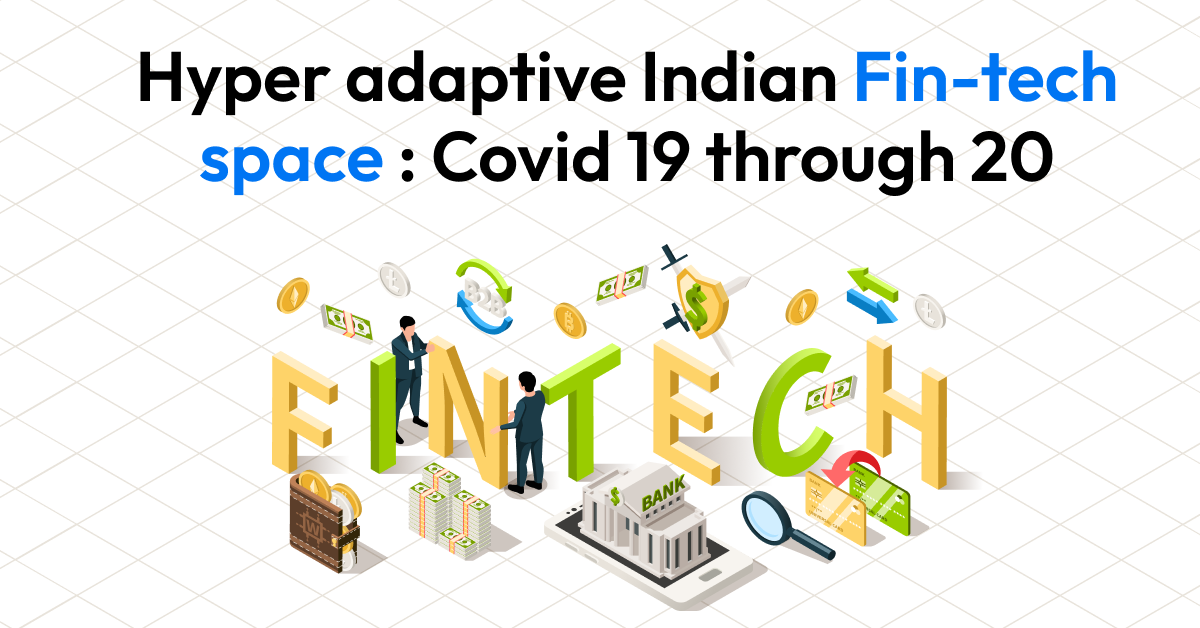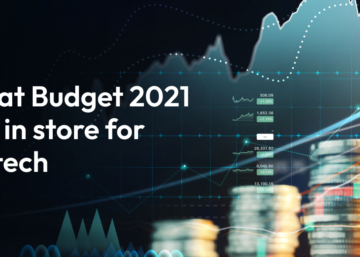India is the land of opportunities, highest possibilities and energy to drive success. Being the country with the largest young population, this attracted huge interest among the investors and businesses to step in India. IT, Biotechnology, Pharmaceutical, Textiles these are some major names which are showing promising growth but aforesaid of this one more segment which has created its huge footprint is FINTECH.
India has become a prominent host of the fintech space since it saw a huge growth in investments across the aisle, that is doubled to 37 billion in 2019 from 1.9 billion in 2018. This makes India the world’s third largest fintech player, right behind the United kingdom, United States.
Lets understand the Pre COVID and Post COVID industry opportunities and impact on the Indian ecosystem in this blog.
As per a global research report of venture finance data and made sure India has become a promising actor in the fintech space.
At Zoop.one we have contributed our best talent and effort in the fintech sector with our ever evolving products and highly customer centric research and release cycles. We truly believe in the Indian Fintech revolution which began over 5 years ago and there is always so much to chip in.
Over the last few years Fintech has made a significant impact on the financial services sector, not only redefining the development of financial services products but also creating alternate channels of delivery, and providing the opportunity to significantly expand the reach and scope of financial services.
Promising Fintech Statistics Snapshot
These statistics are from the pre covid world, as promising as they seem to be, we can only imagine how we would turn the covid fiasco around in our favour and devise strategic initiatives to make sure they are going to help the economy recover in whatever form and also penetrate some helping juice.
1. The Indian Fintech market is forecast to touch USD 2.4 billion by 2020 from a current USD 1.2 billion, as per NASSCOM
2. The transaction value for the Indian fintech sector was estimated to be approximately USD 33 billion in 2016 and is forecast to reach USD 73 billion in 2020 growing at a five-year CAGR of 22%
3. Economic Impact of Fintech and Digital finance
- GDP Impact: USD 700Bn boost by 2025
- USD 800 Bn New deposit
- USD 600 Bn new credit
4. e-Governance — USD 3 Bn reduction in leakages — resulting in USD 2 Bn savings in subsidies
5. New Employment Creation
- India produces 12 million STEM graduates every year
- Fintech and digital finance can create 21 million new jobs
China and India Lead the way in Global Adoption
A survey of 27000 customers in 27 markets showed the percentage of people who have used at least one fintech service.
Foundational & Strong Government Support Structure
The financial technology sector has been a focus area for the government for some years now. The push to a digital economy has seen the rise of fintech start-ups as well as the entry of global fintech firms into India. In fact, while presenting the recent union budget, Finance Minister Nirmala Sitharaman also underlined the importance of a digital economy and what would it mean for the Indian merchants and business who see the friction of paper cash economy behind them, taking things digital also means more and more business can now set up their eshops without hassle unlike in the previous days.
Alongside these other steps, the Finance Minister announced that the government would set up an app-based invoice financing loans platform for MSMEs. While the chief beneficiaries are undoubtedly MSME companies, it is also very promising for fintech companies. The push to widen the government’s e-marketplace or GeM also promises an opportunity for fintech.
When the government is bullish on fintech, it’s a promising sign. This is one of the main reasons global fintech players have entered India.
A steady and revolutionary impact on the jobs market
As per a reliable research report by McKinsey, widespread adoption of digital and expanded use of available digital finance could assuringly increase the overall GDP of all emerging economies by a sharp margin of 6 percent, or lets say a total of $3.7 trillion, by the year 2025. When put in comparison, this is the equivalent of Germany, yes, an economy the size of germany, larger than all the economies of Africa when put head to head. one that’s larger than all the economies of Africa. This additional GDP could create up to 95 million new jobs across all sectors of the economy .
Beyond Covid-19 : A promising future for Fintech
In a post COVID-19 society, the world will experience a sharp shift in the Indian consumers behaviour with an ever growing preference for digital or contactless payments, a wholly renewed emphasis on savings and investment to create a household capital cushion for uncertain times, and increased interest in health and life insurance to manage future unforeseen financial shocks.
How are fintechs paddling through the crisis?
Many fintechs alongside the rigorous financial system have gone into overdrive to paddle this crisis and respond existingly, responding to the crisis. These include insurance tech as well as proptech companies, who are shoring up their enormous capital and secured funding from investors and lenders. Others have implemented rigorous cost-saving measures which mostly consist of workforce reduction. This comes as revenues depend on transaction and volumes, a priority strategy right now is making sure that as many expenses as possible are variable and fixed expenses are minimized.
Expanding Partnership strategies unlike ever before
An important outcome of COVID-19 for fintechs may well be the continued acceleration of partnerships with financial institutions, which can offer the benefits of capital, distribution access, and compliance infrastructure, but often lack highly sought-after digital solutions. For example, Blend, an established digital mortgage software provider, is seeing a strong increase in the number of interested banks that are not configured to the CARES Act.
Fintechs may also continue to look for partnership opportunities with other fintechs, bigtechs, and nonfinancial services firms. This partnership trend, including white-labeled fintech solutions, is expected to accelerate. Growth in open banking and banking-as-a- service regulations and initiatives could play an important role here.
Digital Lending needs to rethink their business models
Disbursement wise, the lenders will and should look forward to diversifying their existing portfolios to include more and more loan products like gold loan or securities-backed loan systems that can assure a return or provide a better guarantee of repayment in any format, but the assurance is necessary over here.
Keeping in mind the financial constraints that would be imposed on the borrowers due to partial loss in income, the credit lines and tenures will need to be revisited and existing models will need to find new revenue streams to survive this sort of an apocalypse. This is not going to be quick and easy but after all, they need to dig deep and diversify streams wherever seems possible.
How zoop can support Digital lenders and help to create change:
The market will see a steady rise in business use of Digital Identity, Financial Analysis and Digital contracting as they make traditional operations more efficient and less time consuming while also being heavily reliable in the longest run. These existing business models will need to evolve towards that in the nearest future as their existing business models aren’t gonna paddle through the demand crash we have in front of us.
At Zoop.one we have contributed our best talent and effort in the fintech sector with our ever evolving products and highly customer centric research and release cycles. We truly believe in the Indian Fintech revolution which began over 5 years ago and there is always so much to chip in.
Being one of the industry leader in “Know Your Customer” zoop.one has extended its services across many verticals to help fintechs in reading and verifying POA and POI with following services:
- Identity as a service: Where zoop can help you to understand who is the customer, from where he/she is, and are the document shared genuine
- Financial Analysis: Understanding the financial capability of customers is very important to do the underwriting. Zoop provides advanced “Bank Statement Analysis” services along with “Credit Bureau analysis” and “Income Tax Reporting” to ensure financial credibility is checked.
- Digital contracting: Never before seamless exposure to make customer onboarding and contract signing at one stop where no physical intervention is required. Customers can easily sign a contract as per his/her choice.
For more details please visit www.zoop.one or contact us at sales@zoop.one



